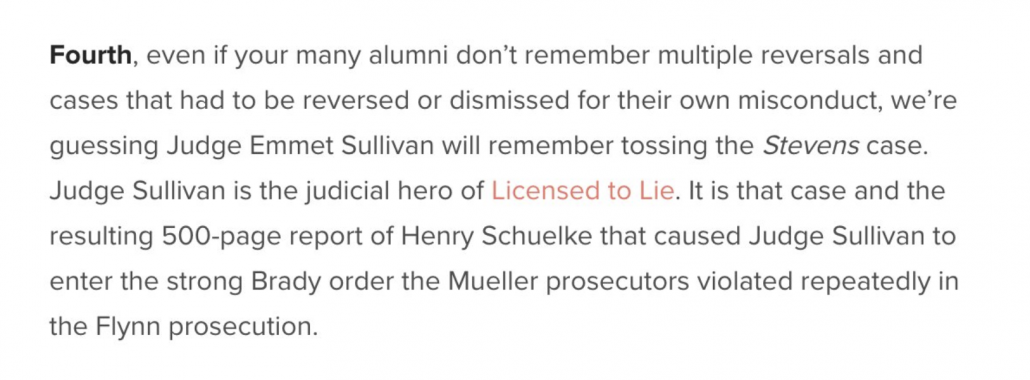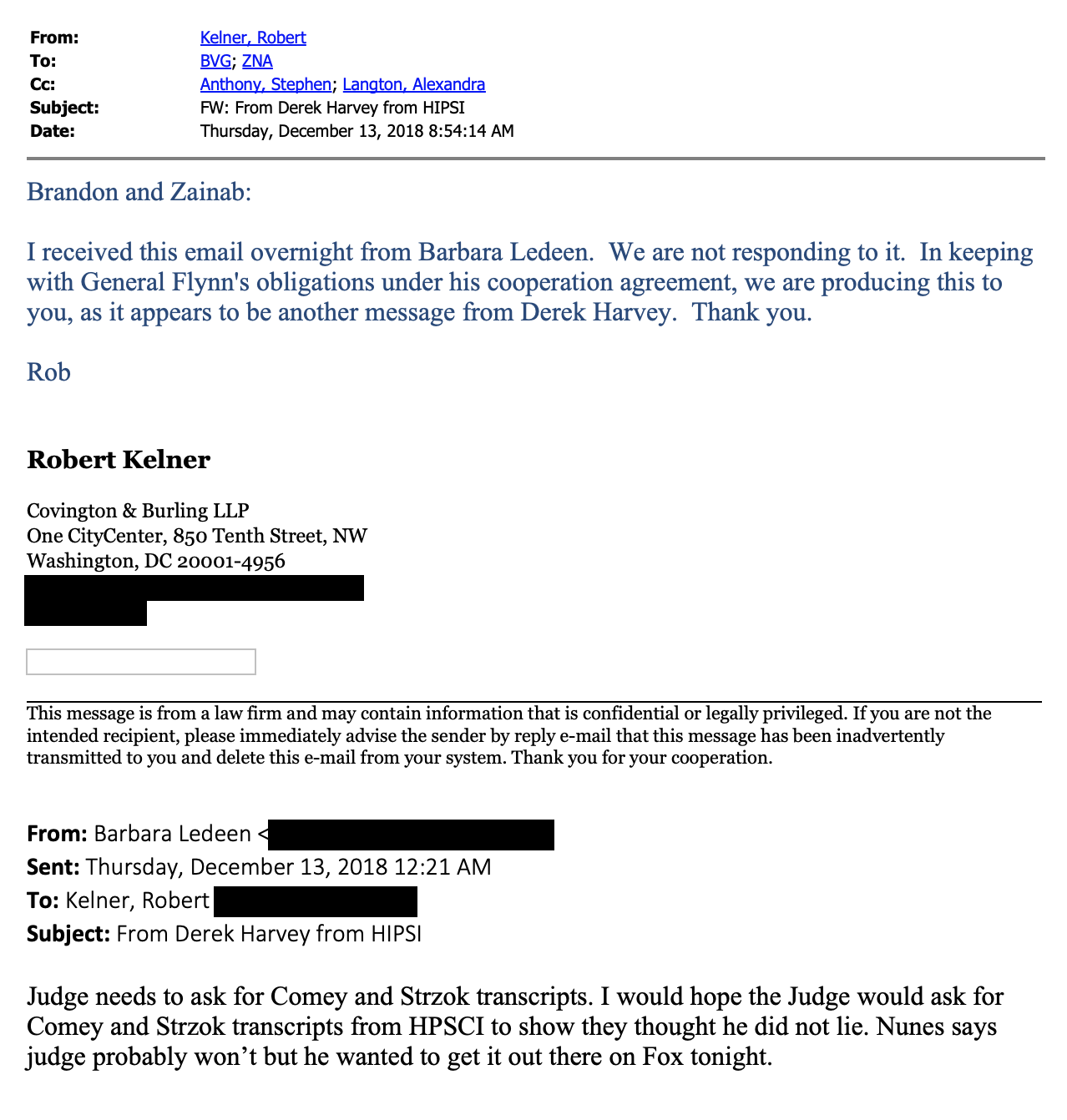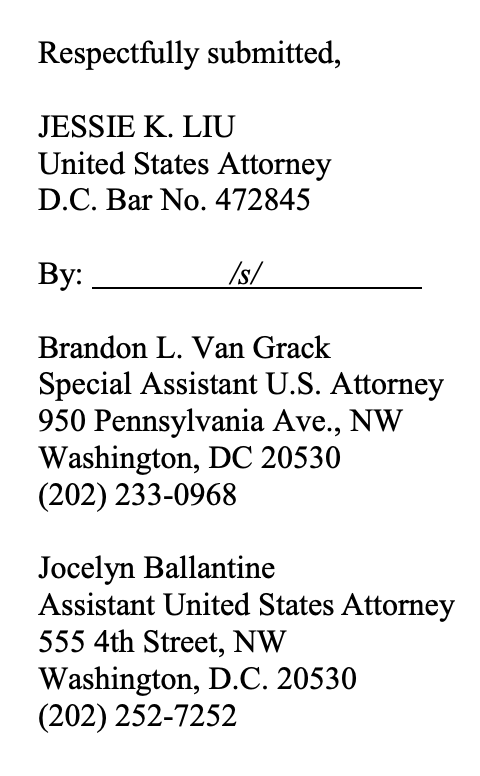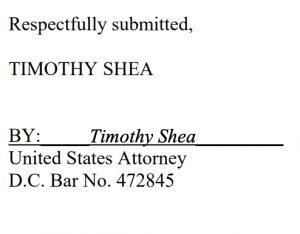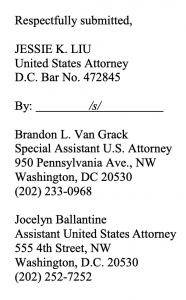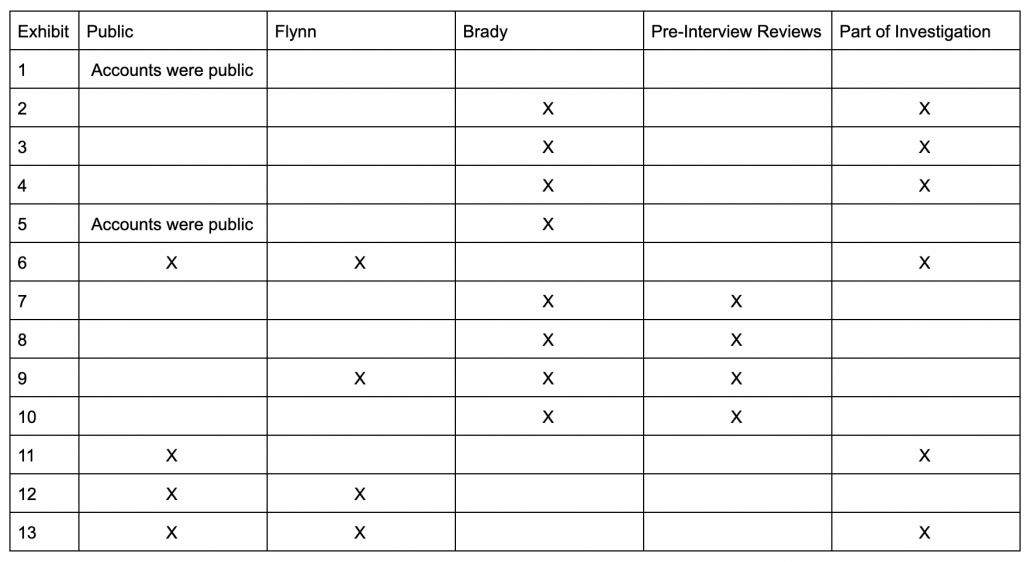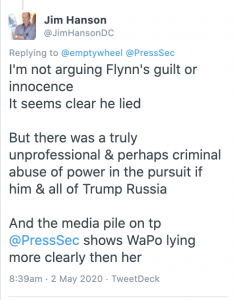The Legal Posture of the Flynn Case: Emmet Sullivan Has Up to Six Pending Decisions, Not One
Partly as a public service (the vast majority of people who are commenting on DOJ’s actions seem to be unfamiliar with the docket) and partly to set up a post I will do attempting to explain why Billy Barr did something as aggressive as he did last week, I wanted to lay out where all the moving pieces in Mike Flynn’s case stand.
Flynn blows up a probation sentencing with mixed claims about his prosecution
Prosecutors first started moving towards sentencing Flynn in June 2018; it’s clear the investigation was still ongoing but they asked to have Flynn’s presentencing report filed so they could move quickly after that. We now know that this was days after Flynn testified to the grand jury in the Turkish influence peddling case. There were reports Flynn was anxious to be sentenced so he could start earning a living again and in this time period, he registered to start influence peddling again, before his lawyers got him to claim that was just a mistake. On September 17, 2018, prosecutors said they were ready to move towards sentencing and asked for a date starting in November, after the midterms. The hearing ultimately got scheduled for December 18, 2018, after Jeff Sessions had been fired and Trump had announced he would nominate Bill Barr to be Attorney General (he didn’t actually send the nomination to the Senate until January 3, 2019, for reasons that likely have to do with Matt Whitaker’s Vacancy Reform Act status).
At that point, prosecutors recommended a sentence within guidelines and a downward departure, which is consistent with probation. Had Flynn left well enough alone, he would have gotten a year of probation and he’d be free and clear of the justice system by now.
He didn’t leave well enough alone. He got cute, claiming to accept guilt but at the same time floating the first of his complaints about being perjury trapped by mean old FBI agents. In response, not only did Judge Emmet Sullivan release the documents that revealed Flynn lies were worse than known, but he put Flynn under oath, both to reallocute his guilty plea, but also to swear that he didn’t think the circumstances of his interview made him any less guilty. After Sullivan made it clear that if he sentenced Flynn that day, he’d give him prison time, Flynn decided to wait until he was done cooperating after testifying at his partner Bijan Kian’s trial.
On February 14, 2019, the day Billy Barr was confirmed, Flynn sent a tweet suggesting “the eagle had landed” to Matt Gaetz, whose assaults on the Mueller investigation he had previously cheered in 2018.
After Barr was confirmed, Mueller quickly moved to write up his report, which was completed on March 22 and released on April 19, 2019. Mueller did not close his office, however, until May 29, when he gave a hasty press conference even as the final outstanding piece of evidence — Roger Stone aide, Andrew Miller’s testimony — came in.
When Mueller testified before Congress two months later on July 24, the most newsworthy thing he said was that FBI was still investigating the counterintelligence impact of Mike Flynn’s lies.
[Congressman Raja] KRISHNAMOORTHI: For example, you successfully charged former National Security Advisor Michael Flynn of lying to federal agents about this conversations with Russian officials, correct?
MUELLER: Correct.
KRISHNAMOORTHI: Since it was outside the purview of your investigation your report did not address how Flynn’s false statements could pose a national security risk because the Russians knew the falsity of those statements, right?
MUELLER: I cannot get in to that, mainly because there are many elements of the FBI that are looking at different aspects of that issue.
KRISHNAMOORTHI: Currently?
MUELLER: Currently.
Flynn replaces Covington for Powell and Blows Up the Bijan Kian Trial
Exactly a week later, Flynn replaced his competent attorney, Rob Kelner, with Fox News firebreather, Sidney Powell, who moved immediately to collaborate with Bill Barr to undermine his prosecution.
In late June, Flynn started reneging on the testimony he provided in the Kian trial. As a result, the government tried to change their plan for the prosecution, attempting to admit Flynn’s prior testimony as a co-conspriator of unregistered foreign agents (who were charged under 18 USC 951, not just as lobbyists). Flynn intervened to fight that (not least, because it would completely doom any effort to avoid prison), blaming Kelner for making him submit a false FARA declaration even while submitting evidence actually showing that Flynn misled Kelner during the filing process. The move predictably helped Kian, as those events were key in Judge Anthony Trenga’s decision to throw out his conviction (which is currently being appealed, but which I expect DOJ to try to blow up in a further attempt to protect Flynn), but it also started a series of claims from Flynn that directly conflicted with his past sworn statements.
Sullivan, noting what was happening over in EDVA, asked the sides to weigh in, which is how Flynn’s team first started making claims in Sullivan’s court that the government, not Flynn, had reneged, all while submitting evidence showing the contrary.
Which is to say, even before Powell took a single action in the Flynn case, Flynn had created further exposure for himself.
As part of a Brady motion, Flynn moves to dismiss the prosecution
The first legal step Sidney Powell took was to submit a motion to compel Brady material. The first filing, on August 30, made no specific request (though did demand more classified information on behalf of Flynn, who of course had confessed to secretly working for a foreign government during the campaign). Powell also asked for more time. Days after submitting that, however, Powell and her colleagues demanded security clearances. On September 11, a more detailed motion was unsealed. That motion included a long list of demands, many based on wild conspiracy theories; the list largely tracked the one Powell had sent to Barr three months earlier, though she generally moderated her language and added a number of requests pertaining to the Turkish investigation that weren’t included in her Barr letter.
Many of these items are among those the government relied on in its motion to dismiss last week, proving the documents were in no way “new.”
Almost two weeks later, Flynn cleaned up some problems in the original request.
On October 1, prosecutors provided a timeline showing they had already produced everything they believed Flynn was entitled to. The same day, they responded to the Brady motion with a detailed response to each of Flynn’s demands, as well as two exhibits showing that this was part of a larger effort to undermine the Mueller investigation (which I addressed here).
On October 15, Flynn demanded evidence from Joseph Mifsud’s phone — which further established Sidney Powell didn’t care about whether her demands related to her client, but also that she had an open channel of communication with Bill Barr about his Durham investigation.
In Powell’s reply to the government, she included a new demand: that Judge Sullivan dismiss the case for misconduct based on precisely the claims made by DOJ last week.
As new counsel has made clear from her first appearance, Mr. Flynn will ask this Court to dismiss the entire prosecution based on the outrageous and un-American conduct of law enforcement officials and the subsequent failure of the prosecution to disclose this evidence— which it had in its possession all along—either in a timely fashion or at all.
[snip]
The FBI had no factual or legal basis for a criminal investigation, nor did they have a valid basis for a counter-intelligence investigation against an American citizen, and they all knew it. 11 Exs. 5, 6. The evidence the defense requests will eviscerate any factual basis for the plea and reveal conduct so outrageous—if there is not enough already—to mandate dismissal of this prosecution for egregious government misconduct.
[snip]
In its relentless pursuit of Mr. Flynn, the government became the architect of an injustice so egregious it is “repugnant to the American criminal system.” Russell, 411 U.S. at 428 (citations omitted). For these reasons and those in our original Motion and Brief in Support, this Court should compel the government to produce the evidence the defense requests in its full, unredacted form. Given the clear and convincing evidence herein, this Court should issue an order to show cause why the prosecutors should not be held in contempt; and should dismiss the entire prosecution for outrageous government misconduct.
The government noted Powell’s new arguments and got permission to submit a surreply, in which they pointed out that Flynn was already in possession of the information he was using to argue for dismissal when he pled guilty the second time.
Although the defendant now complains about the pace of that discovery, before December 18, 2018, the defendant was in possession of all of the information on which he now bases his argument that the case should be dismissed due to government misconduct. See Reply at 1-2, 16, 26; Notice of Discovery Correspondence, United States v. Flynn, 17-cr-232 (D.D.C. Oct. 1, 2019) (Doc. 123). Thereafter, on December 18, 2018, the defendant and his counsel affirmed for this Court that they had no concerns that potential Brady material or other relevant material had not been provided to the defendant. See Hearing Transcript at 8-10, United States v. Flynn, No. 17-cr-232 (D.D.C. Dec. 18, 2018) (“12/18/2018 Hearing Tr.”). The defendant further affirmed, under oath, that he wished to proceed to sentencing because he was guilty of making false statements to the FBI. See id. at 16.
[snip]
Nor did law enforcement officials engage in “outrageous” conduct during the criminal investigation and prosecution of the defendant. On January 24, 2017, when the defendant lied in his interview, the FBI was engaged in a legitimate and significant investigation into whether individuals associated with the campaign of then-candidate Donald J. Trump were coordinating with the Russian government in its activities to interfere with the 2016 presidential election. The defendant was not “ambushed” at the interview, and the interviewing agents certainly did not engage in “outrageous” conduct that undermines the fact that he lied. Reply at 1, 7. The documents produced by the government in discovery show that the FBI asked the defendant for permission to conduct the interview, informed the defendant that the questions would concern his “contacts with the Russian Ambassador to the United States,” interviewed the defendant in his own office, and afforded him multiple opportunities to correct his false statements by revisiting key questions. See, e.g., Memorandum of Andrew McCabe dated January 24, 2017 (Doc. 56-1) (“McCabe Memo”); Strzok 302.
[snip]
For all of the above reasons, it is no surprise that with the same set of facts, the defendant and his prior counsel previously represented to this Court that the circumstances of the interview had no impact on his guilt, or guilty plea. On December 18, 2018, when the Court asked the defendant if he wished to “challenge the circumstances on which you were interviewed by the FBI,” he responded, under oath, “No, Your Honor.” 12/18/2018 Hearing Tr. at 8.10 The Court then asked the defendant if he understood that “by maintaining your guilty plea and continuing with sentencing, you will give up your right forever to challenge the circumstances under which you were interviewed,” to which the defendant answered, “Yes, Your Honor.” Id. And when the Court queried whether the defendant wanted an opportunity to withdraw his plea because one of the interviewing agents had been investigated for misconduct, the defendant stated “I do not, Your Honor.” Id. at 9. His counsel likewise represented to the Court that their client was not “entrapped by the FBI,” and that they did not contend “any misconduct by a member of the FBI raises any degree of doubt that Mr. Flynn intentionally lied to the FBI.” Id. at 11-12.
In a sur-surreply, Powell tried to back off having demanded that Sullivan dismiss the case, saying that her past arguments and the government’s response aren’t her real motion to dismiss.
In conclusion, yes, the government engaged in conduct so shocking to the conscience and so inimical to our system of justice that it requires the dismissal of the charges for outrageous government conduct. See United States v. Russell, 411 U.S. 423, 428 (1973). However, as fully briefed in our Motion to Compel and Reply, at this time, Mr. Flynn only requests an order compelling the government to produce the additional Brady evidence he has requested—in full and unredacted form—and an order to show cause why the government should not be held in contempt. At the appropriate time, Mr. Flynn will file a separate motion asking that the Court dismiss the prosecution for egregious government misconduct and in the interest of justice. Mr. Flynn is entitled to discovery of the materials he has requested in these motions and briefs that will help him support such a motion.
In Emmet Sullivan’s meticulous 92-page order issued in December denying Flynn’s Brady request, however, he addressed the request for dismissal, specifically distinguishing this case from that of Ted Stevens.
Mr. Flynn’s requested relief is dismissal of this case. See Def.’s Reply, ECF No. 133 at 36; see also Def.’s Sur-Surreply, ECF No. 135 at 17. He seeks dismissal of the charges against him and the entire prosecution for government misconduct. E.g., Def.’s Reply, ECF No. 133 at 7, 23 n.15, 36; Def.’s SurSurreply, ECF No. 135 at 17. The government disagrees. See Gov’t’s Surreply, ECF No. 132 at 12-15. This case is not United States v. Theodore F. Stevens, Criminal Action No. 08–231(EGS), the case that Mr. Flynn relies on throughout his briefing. In that case, the Court granted the government’s motion to dismiss, and the government admitted that it had committed Brady violations and made misrepresentations to the Court. In re Special Proceedings, 825 F. Supp. 2d 203, 204 (D.D.C. 2011) (Sullivan, J.). Even if Mr. Flynn established a Brady violation in this case, dismissal would be unwarranted because “[t]he remedy for a Brady violation is retrial, not dismissal.” United States v. Borda, 941 F. Supp. 2d 16, 19 n.1 (D.D.C. 2013) (citing Pettiford, 627 F.3d at 1228). “[D]ismissal is appropriate only as a last resort, where no other remedy would cure prejudice against a defendant.” Pasha, 797 F.3d at 1139. [my emphasis]
As the government noted when they responded to Flynn’s request for dismissal, he already had all the evidence on which he premised that demand when he pled guilty a second time in December 2018.
In a sentencing memo, the government accounts for Flynn’s failed cooperation and refusal to admit guilt
In the wake of Sullivan’s order, the parties moved towards sentencing in January. The government got two continuances before submitting their revised motion, one in December and another in January, to get all required approvals for their sentencing memo. That means prosecutors on the case went to great lengths to approve their recommendation for prison time.
The factors enunciated in Section 3553(a) all favor the imposition of a sentence within the Guidelines range. The defendant’s offense is serious, his characteristics and history present aggravating circumstances, and a sentence reflecting those factors is necessary to deter future criminal conduct. Similarly situated defendants have received terms of imprisonment.
I’ll return to that memo, but the key point is that Judge Sullivan specifically gave Bill Barr’s DOJ time to ensure that the chain of command approved their supplemental sentencing memo.
Before Flynn responded to that revised recommendation, they asked for a continuance to allow them to withdraw Flynn’s guilty plea, specifically citing prosecutors’ recommendation for prison time.
Because Flynn submitted his supplemental sentencing memo after beginning the process to withdraw his guilty plea, they were stuck arguing in it both that Flynn should get credit for admitting guilty but also arguing that he was not guilty.
The government reply, submitted as Barr started the process to replace Jessie Liu, is the one that alerted everyone to the shenanigans that Barr was up to. Whereas the initial supplemental motion — which had been delayed twice to get approval — recommended prison time, this one reverted back to supporting probation, the position the government had adopted before Flynn had reneged on both his cooperation and his guilty.
Flynn blames his guilty pleas on his Covington lawyers
As noted, Flynn cited the recommendation for prison time in asking to withdraw his guilty plea(s). Flynn based his request to withdraw his guilty plea on a claim that his very competent Covington lawyers were both conflicted and incompetent. He then submitted what was originally called a supplement — which made no new arguments — which they subsequently corrected to note,
1 This is not Mr. Flynn’s “Supplemental Motion to Withdraw for Alternative Additional Reasons” currently due to be filed on January 22, 2020, for which we have requested two additional days to complete and file.
In response to a second request for more time on its filings, Judge Sullivan issued an order that reflects where he’ll likely go now: he raised the prospect of an evidentiary hearing to determine whether there is good cause to set aside his guilty plea.
Mr. Flynn’s supplemental motion and the government’s response shall address the following: (1) the standard in this Circuit for a defendant seeking to withdraw a guilty plea before sentencing; and (2) the need for an evidentiary hearing where the parties would present all testimony and evidence concerning the issue of whether Mr. Flynn can show that there is good cause to set aside his guilty pleas, see United States v. Cray, 47 F.3d 1203, 1206 (D.C. Cir. 1995), including testimony from Mr. Flynn and other witnesses under oath, subject to cross-examination, to show any “fair and just reason” for this Court to grant his motion to withdraw, Fed. R. Crim. P. 11(d).
From that moment forward, it became clear that Sullivan would put Flynn back under oath.
On February 9, prosecutors made things still worse, by asking Sullivan to waive Covington’s attorney-client privilege with respect to Flynn so they could assist prosecutors in rebutting his claims that they were incompetent. From that point forward, it became clear that not only Flynn, but his very credible former lawyers, would be testifying about the prosecution.
On January 29, just two days before Bill Barr would replace Jessie Liu with his flunky and around the same time he ordered Jeffrey Jensen to review the Flynn prosecution, Flynn submitted what he billed as his real supplemental motion to withdraw, doubling down on the claim that his former lawyers were responsible for his guilty pleas, he wasn’t.
As I noted at the time, the motions in conjunction created new risks for Flynn: in particular, his motion to withdraw included a sworn declaration that conflicted with three past sworn statements from him:
- December 1, 2017: Mike Flynn pled guilty before Judge Rudolph Contreras to lying in a January 24, 2017 FBI interview. In his plea allocution, Flynn admitted:
- He lied about several conversations with Sergey Kislyak about sanctions
- He lied about several conversations with Kislyak about an attempt to undermine an Obama effort at the UN
- He lied about whether his company knew that it was working for the government of Turkey and about whether senior officials from Turkey were overseeing that contract
- He was satisfied with the services his attorneys had provided
- No other threats or promises were made to him except what was in the plea agreement
- December 18, 2018: Mike Flynn reallocuted his guilty plea before Judge Emmet Sullivan to lying in a January 24, 2017 FBI interview. In his plea allocution, Flynn admitted:
- He lied about several conversations with Sergey Kislyak about sanctions
- He lied about several conversations with Kislyak about an attempt to undermine an Obama effort at the UN
- He lied about whether his company knew that it was working for the government of Turkey and about whether senior officials from Turkey were overseeing that contract
- He was satisfied with the services his attorneys had provided
- He did not want a Curcio counsel appointed to give him a second opinion on pleading guilty
- He did not want to challenge the circumstances of his January 24, 2017 interview and understood by pleading guilty he was giving up his right to do so permanently
- He did not want to withdraw his plea having learned that Peter Strzok and others were investigated for misconduct
- During his interview with the FBI, he was aware that lying to the FBI was a federal crime
- June 26, 2018: Mike Flynn testified to an EDVA grand jury, among other things, that “from the beginning,” his 2016 consulting project “was always on behalf of elements within the Turkish government,” he and Bijan Kian would “always talk about Gulen as sort of a sharp point” in relations between Turkey and the US as part of the project (though there was some discussion about business climate), and he and his partner “didn’t have any conversations about” a November 8, 2016 op-ed published under his name until “Bijan [] sent me a draft of it a couple of days prior, maybe about a week prior.” The statements conflict with a FARA filing submitted under Flynn’s name.
- January 29, 2020: Mike Flynn declared, under oath that, “in truth, I never lied.” Flynn claims he forgot about the substance of his conversations with the Russian Ambassador, rather than lied about them.
To make things worse, as often happens with exhibits Sidney Powell introduces, the actual record undermined claims Flynn made. For example, Flynn included a document that showed Covington gave him more warnings about conflict than he admitted to in his declaration, thereby making it clear his sworn declaration didn’t match the record accompanying it.
Flynn repeats his claim he was railroaded
That same day Flynn submitted his most substantive motion to withdraw his guilty plea, January 29, he also submitted a motion to dismiss his prosecution. It was basically a repeat of the request made months earlier as part of the Brady request, pointing to irregularities in the Carter Page FISA application as the primary justification to make the motion anew.
On February 12, prosecutors responded to that motion pointing out there was nothing new here. Flynn’s response was repetitive and included a misleading timeline full of claims that contradict claims they’ve made elsewhere. The motion ignored that Flynn waived these complaints when he pled guilty the second time.
The government repeatedly claims that Mr. Flynn waived his right to constitutional protections when he pled guilty. ECF No. 169 at n.3. But, Mr. Flynn’s plea cannot stand, and the government cannot use it as both a shield for its misconduct and a sword to sentence Mr. Flynn. His plea was infected with constitutional error which rendered it neither knowing nor voluntary and in violation of Mr. Flynn’s Sixth Amendment rights. See ECF No. 162-2. As Mr. Flynn argued in his Motion to Withdraw Plea, ECF No. 151, even if it were a validly contracted plea, the government breached the contract the moment Mr. Van Grack filed the government’s supplemental sentencing memo which withdrew its motion for downward departure and its recommendation of probation. See ECF No. 150 at 3 (“In addition to asking the Court to credit the defendant with providing substantial assistance, the government recommended that the defendant receive credit for accepting responsibility. . . . [T]he government now withdraws both requests.”).
As prosecutors prepare their Covington argument, Bill Barr prepared his “new” information
As noted, on February 9, prosecutors took steps to be able to prove that Covington, in fact, gave Flynn exceptionally good advice. They asked for a series of delays while they did that. According to the schedule set by Judge Sullivan, prosecutors would have proposed a briefing schedule to lay all that out last Friday, possibly in a motion including some of the details from the 600 pages of evidence obtained from Covington that (the record already shows) would substantiate that Flynn gave them incorrect information for his FARA filing and repeatedly brushed off warnings about conflict.
During the delay, Covington did find 6,000 new records on top of the 600,000 documents they had already provided. Given the Bates numbers of documents filed last week, there’s no reason to believe those exhibits were included in these newly discovered documents.
As that was happening, prosecutor Jocelyn Ballantine handed over, drip-by-drip, the documents that Jeffrey Jensen “analyzed.”
Beginning in January 2020, at the direction of Attorney General William P. Barr, the United States Attorney for the Eastern District of Missouri (“USA EDMO”) has been conducting a review of the Michael T. Flynn investigation. The review by USA EDMO has involved the analysis of reports related to the investigation along with communications and notes by Federal Bureau of Investigation (“FBI”) personnel associated with the investigation.
The enclosed documents were obtained and analyzed by USA EDMO in March and April 2020 and are provided to you as a result of this ongoing review; additional documents may be forthcoming. These materials are covered by the Protective Order entered by the Court on February 21, 2018.
None of this discovery correspondence said the documents were new to prosecutors, only that Jensen had reviewed them. They were, nevertheless, the documents that Timothy Shea claimed were “new” as his basis for flip-flopping on DOJ’s position on the case.
Emmet Sullivan has six decisions to make, not just one
Many, perhaps most, people who’ve commented in the last week have noted that Emmet Sullivan has the prerogative whether to accept DOJ’s motion or not. It’s true he has that authority. But he actually has up to six different decisions pending, as follows:
- Whether to accept or reject DOJ’s motion to dismiss
- If Sullivan accepts DOJ’s motion to dismiss, whether he does so with or without prejudice
- Whether to accept or reject Flynn’s motion to withdraw his pending withdraw of guilty plea, motion to dismiss, and waiver of privilege for Covington (to which DOJ has consented)
- Whether to hold an evidentiary hearing or ask for briefing on Flynn’s motion to withdraw
- Whether to accept or reject Flynn’s motion to dismiss his prosecution
- Whether and if so how to sentence Flynn based on fully briefed sentencing memoranda
Sullivan would not get to most of these without, first, deciding what to do about DOJ’s motion to dismiss. And if he rejected DOJ’s motion to dismiss, he would obviously reject Flynn’s motion to dismiss, just like he already rejected that argument. Though if Sullivan does reject DOJ’s motion to dismiss, sentencing is fully briefed and he could move immediately to sentencing.
Moreover, Flynn’s multiple conflicting sworn statements are before this court whether or not Sullivan rejects DOJ’s motion to dismiss. And he could reach that decision — or at least order briefing on the Covington evidence Flynn clearly wants to keep hidden — without (or before) weighing in on DOJ’s motion to dismiss.
Which is likely one of the reasons Sullivan is taking his time before he issues the next scheduling order.
Update: I should have put this quote on behalf of Chris Wray in several posts before this one. But basically, the FBI has already put it into the public record that the stuff DOJ claimed was “new” last week had already been reviewed by DOJ IG and John Durham’s inquiry.
With regard to certain documents in the Michael Flynn matter from the 2016-2017 time period that are now the subject of reporting by the press, the FBI previously produced those materials to the Inspector General and U.S. Attorney Durham,” the FBI said.


